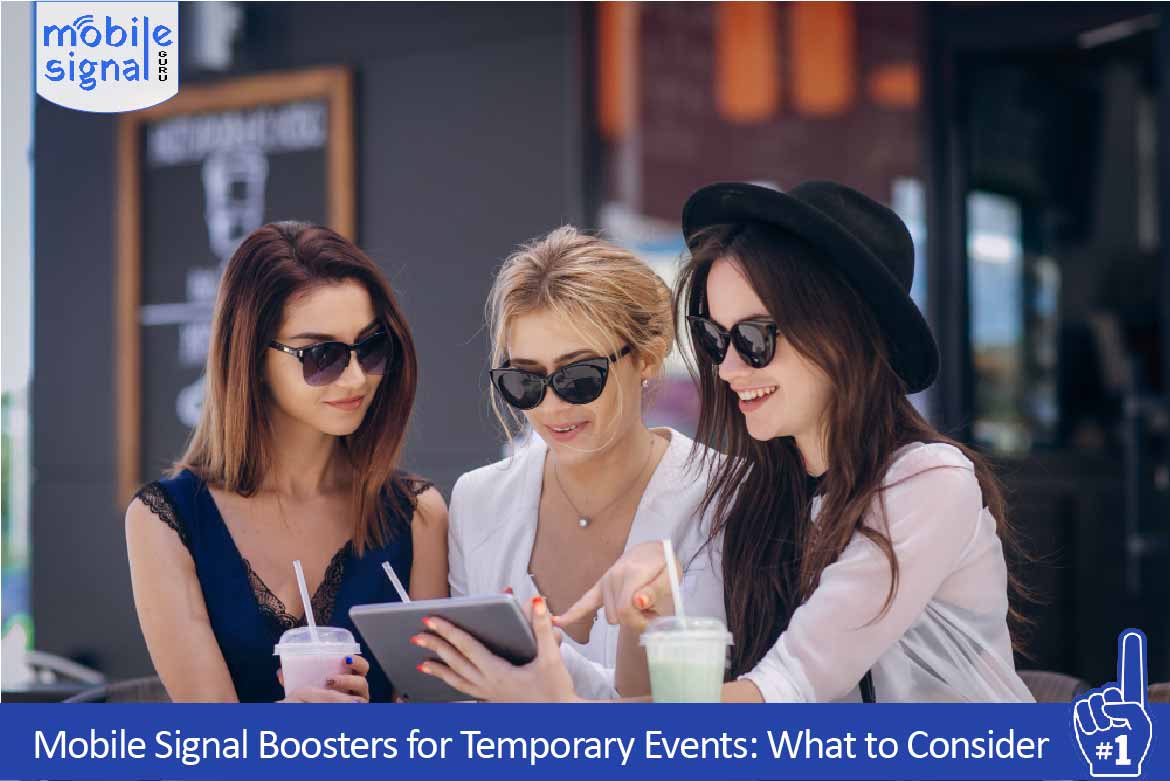Hosting a temporary event, whether it’s a conference, concert, or festival, requires seamless communication. One key factor often overlooked is mobile network coverage. If you’re expecting large crowds, reliable mobile connectivity is essential for communication, event management, and even attendee satisfaction. This is where mobile signal boosters come in. They can enhance weak signals and ensure stable connections throughout the event. However, choosing the right signal booster requires careful consideration. In this article, we’ll discuss what you need to consider when selecting and setting up a mobile signal booster for temporary events.
Why Mobile Signal Boosters are Important for Events
At large events, the surge in mobile phone users can strain the available network. Many events are held in areas with poor cellular coverage, like rural locations or large indoor spaces, which adds to the connectivity problem. Mobile signal boosters can amplify weak signals and ensure better coverage for calls, texts, and data usage, which is critical for event organizers, vendors, and attendees alike.
Key Benefits of Signal Boosters at Events
- Improved communication for event staff: Facilitates smooth coordination.
- Better attendee experience: Enables guests to stay connected.
- Enhanced vendor operations: Supports reliable payment systems for vendors.
Factors to Consider When Choosing a Mobile Signal Booster for Temporary Events
Selecting the right signal booster for your event depends on several key factors, which are discussed below.
Event Location and Signal Strength
Before you select a mobile signal booster, you need to assess the existing signal strength at the event venue. Outdoor areas or large, enclosed spaces may have weak signals due to their distance from cell towers or obstructive materials like metal, concrete, or glass.
To measure the signal strength:
- Use your phone’s field test mode to check the signal strength in decibel-milliwatts (dBm).
- If the signal is weak (less than -90 dBm), a mobile signal booster is needed.
Consider installing the signal booster in areas where the signal is weakest. Outdoor venues may require a stronger signal booster to capture distant signals.
Size and Layout of the Venue
The size of your event venue determines the type of signal booster you’ll need. Small indoor venues may require a less powerful booster, while larger outdoor or multi-story venues need stronger equipment to cover the entire area.
When evaluating the venue:
- Determine the total area in square meters that needs coverage.
- For large events, consider a signal booster that can cover a wide area, such as 1,500 square meters or more.
- Multi-room venues or venues with large obstacles may need multiple indoor antennas to distribute the boosted signal evenly.
Number of Users
Another important factor is the number of people who will be using mobile devices at your event. Mobile signal boosters come with different capacities, so you’ll need to choose one that can handle the anticipated number of users.
For example:
- If you expect a small crowd (under 50 people), a standard signal booster may suffice.
- Larger events (over 100 attendees) may require a signal booster that can handle multiple simultaneous users without slowing down or losing connection.
- The best mobile signal booster for events should support 4G and 5G connections to accommodate data-hungry activities like video streaming and social media usage.
Type of Mobile Signal Booster
There are two main types of mobile signal boosters to choose from:
- Analog boosters: These boosters are commonly used for most events. They capture and amplify existing signals using a simple process. They are cost-effective and cover large areas, but they may struggle in locations with extremely weak signals.
- Smart boosters: These boosters use more advanced technology to adjust the signal strength automatically. They work well in areas with fluctuating signal strength and can provide more consistent coverage. For high-traffic events, smart boosters may be a better choice.
Both options are available for 4G signal boosters and 5G signal boosters, depending on the network requirements of your event.
Compatibility with Mobile Networks
Not all mobile signal boosters work with every network. Before purchasing or renting a signal booster, ensure that it is compatible with the specific frequency bands used by the mobile networks at your event location. In New Zealand, for instance, you’ll need to check the frequency bands of the major carriers, such as Spark, Vodafone, and 2degrees.
To ensure compatibility:
- Confirm that the signal booster supports the correct frequency bands for 4G and 5G networks.
- If your event caters to international attendees, consider a booster that supports multiple frequencies for different regions.
Temporary Setup and Ease of Installation
Since your event is temporary, you’ll want a signal booster that’s easy to set up and dismantle. Many signal boosters come with simple installation instructions, but for larger venues, you may need professional installation.
When setting up a signal booster:
- Place the outdoor antenna in an area with the strongest available signal, such as the roof or a tall structure.
- Ensure that the indoor antennas are positioned to cover the entire venue evenly.
- Test the setup before the event to make sure the booster is working effectively.
Compliance and Certification
Make sure the mobile signal booster you choose complies with local regulations and is certified for safe use. Many countries require mobile signal boosters to meet specific standards to prevent interference with the broader mobile network.
Look for certifications like:
- FCC approval (for U.S. devices)
- CE certification (for European devices)
- ROHS certification (for environmental safety)
Choosing a certified signal booster ensures that you are using a reliable and legal product.
Conclusion
Mobile signal boosters can greatly improve the connectivity and overall experience at temporary events. Whether you’re hosting a small indoor conference or a large outdoor festival, having a strong and reliable mobile signal ensures that staff can communicate easily, attendees stay connected, and vendors can process payments smoothly.
When selecting a mobile signal booster for temporary events, consider the event location, size of the venue, number of users, and the type of booster that best fits your needs. Ensuring compatibility with mobile networks and opting for certified equipment will help maximize the performance of your mobile signal booster. By following these guidelines, you’ll provide a seamless mobile experience for everyone attending your event.
A well-placed and properly installed 4G signal booster or 5G signal booster can make all the difference in keeping your event running smoothly and your attendees happy.
 Australia (AUD)
Australia (AUD) Denmark (DKK)
Denmark (DKK) France (EUR)
France (EUR) Germany (EUR)
Germany (EUR) Ireland (EUR)
Ireland (EUR) Malta (EUR)
Malta (EUR) Netherlands (EUR)
Netherlands (EUR) New Zealand (NZD)
New Zealand (NZD) Norway (NOK)
Norway (NOK) Spain (EUR)
Spain (EUR) Sweden (SEK)
Sweden (SEK) UAE (AED)
UAE (AED) United Kingdom (GBP)
United Kingdom (GBP)
